API Platform
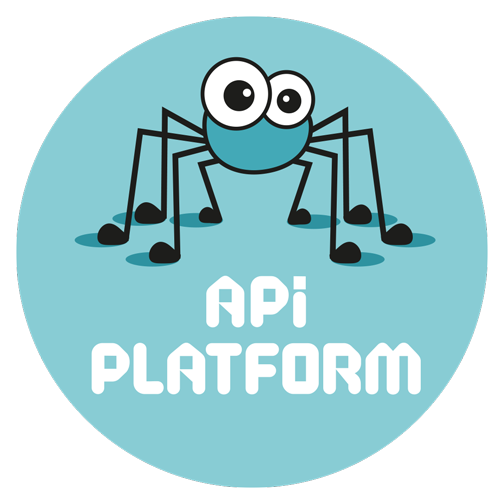
Kévin Dunglas
- Founder of Les-Tilleuls.coop
- Symfony core-team
- API Platform creator
- Teacher at USTL (Lille 1)

Les-Tilleuls.coop
- Self-managed IT company (SCOP)
- Expertise and dev
- Symfony, Angular, Node, Go...
- We are hiring!
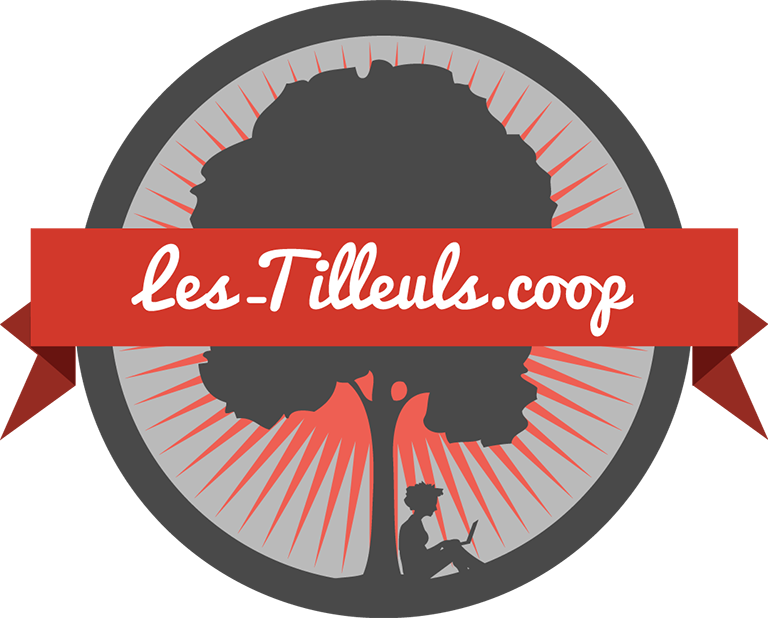
The web has changed!
- More and more Javascript webapps - and Google crawls them
- Users spend more time on mobile than on desktops: responsive websites and mobile apps required
- JSON-LD, Schema.org, Hydra: Linked Data and the semantic web start to be massively used
APIs: the hearth of the new web
- Central point to access data
- Encapsulate business logic
- Same data and same features for desktops, mobiles, customers, providers and partners
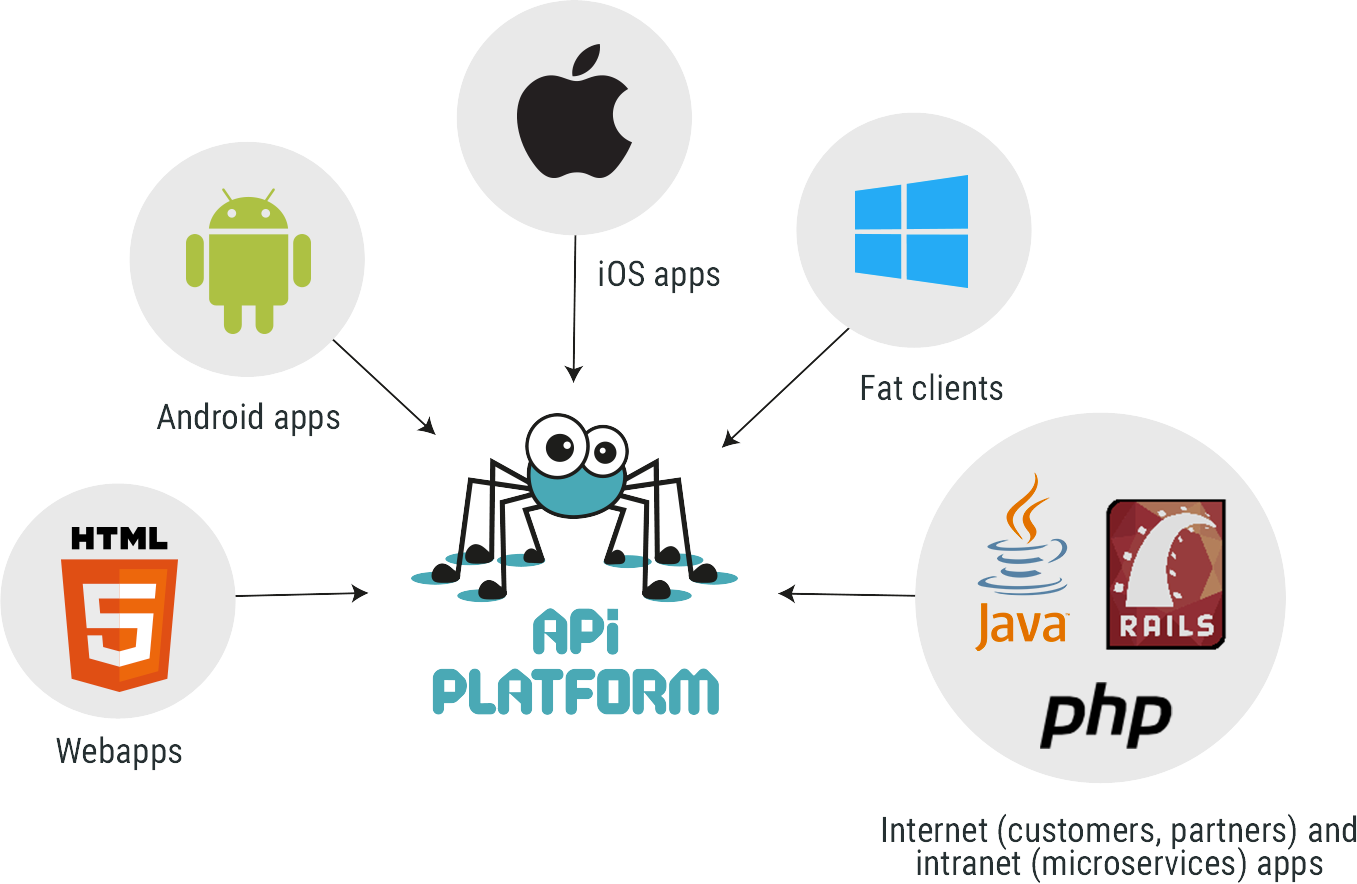
API Platform
A framework for the new web
The big picture
Two separate components
(at least)
- A static HTML5 webapp (SPA)
- A web API
Play well with microservices too.
The web API
- Centralizes R/W access to data
- Holds all the business logic
- Is built with PHP (and API Platform)
- Is stateless (PHP sessions make horizontal scalability harder)
The HTML5 webapp
Or any other client (mobile app...)
- Holds all the presentation logic
- Is downloaded first (Single Page Application)
- Queries the API to retrieve and modify data using AJAX
- Is 100% composed of HTML, JavaScript and CSS assets
- Can be hosted on a CDN
The API and the web app are standalone
- 2 Git repositories and 2 CI
- different servers
- 2 domain names:
example.com,api.example.com - The routing is done client-side using HTML5 push state
Not mandatory for small apps.
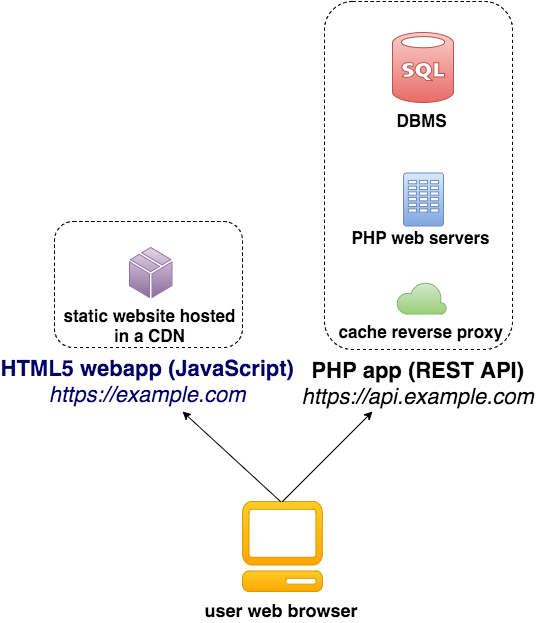
Immediate benefits
Speed (even on mobile)
- Assets including index.html are downloaded from a CDN
- After the first page load: no more download/parse/render bunch of HTML required at each request
- Only small chunks of raw data transit on the network
- API responses can be cached by the proxy
Scalability and robustness
- The front app is just a set of static files: can be hosted in a CDN
- Stateless API: push and pop servers/containers on demand
Development comfort
- A wizard, an autocomplete box? Do it in JS, no more Symfony forms! (API data validation required)
- Reuse the API in other contexts: native mobile, game stations, TV apps, connected devices or heavy desktop clients
- Give access to your customers and partners to access to raw data through the API
Long term benefits
- Better structure: thanks to the central API, less business logic duplication when the app grows
- Easier refactoring: Touching a component has no impact on the other (spec and test the API format)
- Simpler project management: Separate teams can work on each app
Drawbacks
SEO and SMO... but solutions exist!
Formats, (open) standards, patterns
HTTP + REST + JSON
- Work everywhere
- Lightweight
- Stateless
- HTTP has a powerful caching model
- Extensible (JSON-LD, Hydra...)
- High quality tooling
JSON Web Token (JWT)
- Lightweight and simple authentication system
- Stateless: token signed and verified server-side then stored client-side and sent with each request in an Authorization header
- Store the token in the browser local storage
HATEOAS / Linked Data
Hypermedia as the Engine of Application State
- Hypermedia: IRI as identifier
- Ability to reference external data (like hypertext links)
- Generic clients
JSON-LD
JSON for Linked Data
- Standard: W3C recommandation (since 2014)
- Easy to use: looks like a typical JSON document
- Already used by Gmail, GitHub, BBC, Microsoft, US gov...
- Compliant with technologies of the semantic web: RDF, SPARQL, triple store...
{
"@context": "/contexts/Person",
"@id": "/people",
"@type": "hydra:PagedCollection",
"hydra:totalItems": 1,
"hydra:itemsPerPage": 30,
"hydra:firstPage": "/people",
"hydra:lastPage": "/people",
"hydra:member": [
{
"@id": "/people/1",
"@type": "http://schema.org/Person",
"gender": "male",
"name": "Dunglas",
"url": "https://dunglas.fr"
}
]
}Schema.org
- Define a large set of elements: people, creative work, events, products, chemicals...
- Created and understood by Google, Bing, Yahoo! et Yandex
- Massively used, and run by the W3C (Web schemas group)
- Can be used in HTML (microdata), RDF (RDFa) and JSON-LD
- Can be extended (custom vocabularies)
Hydra
- Describe REST APIs in JSON-LD
- = write support
- = auto-discoverable APIs
- = standard for collections, paginations, errors, filters
- Draft W3C (Work In Progress)
API Platform: the promise
- Data model generator using Schema.org
- Fully featured API supporting JSON-LD/Hydra in minutes
- An autogenerated doc
- Convenient API spec and test tools using Behat
- Easy authentication management with JWT or OAuth
- CORS and HTTP cache
- All the tools you love: Doctrine ORM, Monolog, Swiftmailer...
Getting started
composer create-project api-platform/api-platform my-apiAPI Platform <3 Symfony
- Built on top of Symfony full-stack (support 3.0)
- Install any existing SF bundles
- Follow SF Best Practices
- Can be used in your existing SF app
- (Optional) tightly integrated with Doctrine
Boostrap a data model with
the schema generator
Step 1
Pick types and properties you need from Schema.org:namespaces:
entity: AppBundle\Entity
types:
Person:
parent: false
properties:
name: ~
birthDate: ~
gender: ~Step 2
Generatebin/schema generate-types src/ app/config/schema.yml
There is no step 3
<?php
namespace AppBundle\Entity;
use Doctrine\ORM\Mapping as ORM;
use Dunglas\ApiBundle\Annotation\Iri;
use Symfony\Component\Validator\Constraints as Assert;
/**
* A person (alive, dead, undead, or fictional).
*
* @see http://schema.org/Person Documentation on Schema.org
*
* @ORM\Entity
* @Iri("http://schema.org/Person")
*/
class Person
{
/**
* @var integer
* @ORM\Column(type="integer")
* @ORM\Id
* @ORM\GeneratedValue(strategy="AUTO")
*/
private $id;
/**
* @var string The name of the item.
*
* @ORM\Column(nullable=true)
* @Assert\Type(type="string")
* @Iri("https://schema.org/name")
*/
private $name;
/**
* @var \DateTime Date of birth.
* @Assert\Date
* @ORM\Column(type="date", nullable=true)
* @Iri("http://schema.org/birthDate")
*/
private $birthDate;
/**
* @var string Gender of the person.
* @Assert\Type(type="string")
* @ORM\Column(nullable=true)
* @Iri("http://schema.org/gender")
*/
private $gender;
/**
* Sets id.
*
* @param integer $id
* @return $this
*/
public function setId($id)
{
$this->id = $id;
return $this;
}
/**
* Sets name.
*
* @param string $name
*
* @return $this
*/
public function setName($name)
{
$this->name = $name;
return $this;
}
/**
* Gets name.
*
* @return string
*/
public function getName()
{
return $this->name;
}
/**
* Gets id.
*
* @return integer
*/
public function getId()
{
return $this->id;
}
/**
* Sets birthDate.
*
* @param \DateTime $birthDate
* @return $this
*/
public function setBirthDate(\DateTime $birthDate)
{
$this->birthDate = $birthDate;
return $this;
}
/**
* Gets birthDate.
*
* @return \DateTime
*/
public function getBirthDate()
{
return $this->birthDate;
}
/**
* Sets gender.
*
* @param string $gender
* @return $this
*/
public function setGender($gender)
{
$this->gender = $gender;
return $this;
}
/**
* Gets gender.
*
* @return string
*/
public function getGender()
{
return $this->gender;
}
}Thanks to Schema.org and API Platform you get:
- PHP classes, properties, getters and setters (PSR compliant)
- Doctrine ORM mapping (including relations and mapped superclasses)
- Validation constraints from the Validator component
- Full PHPDoc extracted from schema human-readable descriptions
- (optional) PHP interfaces
- (optional)
ResolveTargetEntityDoctrine mappings - (optional) JSON-LD IRI annotations (useful for the API bundle)
PHP Schema is a scaffolding tool
Edit the code and add your custom classes, properties, validation constraints, indexes, IRIs...Expose your data model through an API
the API bundle
github.com/dunglas/DunglasApiBundleDefine resources to expose
# app/config/services.yml
services:
person_resource:
parent: "api.resource"
arguments: [ "AppBundle\Entity\Person" ]
tags: [ { name: "api.resource" } ]
And you got:
- Full CRUD with support for relations and dates
- Data validation
- Collections pagination
- Error serialization
- Automatic routes registration
- Filters on exposed properties
- Sorting
- Hypermedia entrypoint
GET /people
{
"@context": "/contexts/Person",
"@id": "/people",
"@type": "hydra:PagedCollection",
"hydra:totalItems": 1,
"hydra:itemsPerPage": 30,
"hydra:firstPage": "/people",
"hydra:lastPage": "/people",
"hydra:member": [
{
"@id": "/people/1",
"@type": "http://schema.org/Person",
"name": "Dunglas",
"gender": "male",
"birthDate": "1988-21-01T00:00:00+01:00"
}
]
}A collection by API Platform (JSON-LD + Hydra output)
How it works?
The API bundle reuse the following metadata to expose and document the JSON-LD/Hydra API:
- Doctrine ORM
- Validator constraints
- Serializer groups
- PHPDoc
- Your own (by registering custom metadata loaders)
Full support of JSON-LD, Hydra and Schema.org
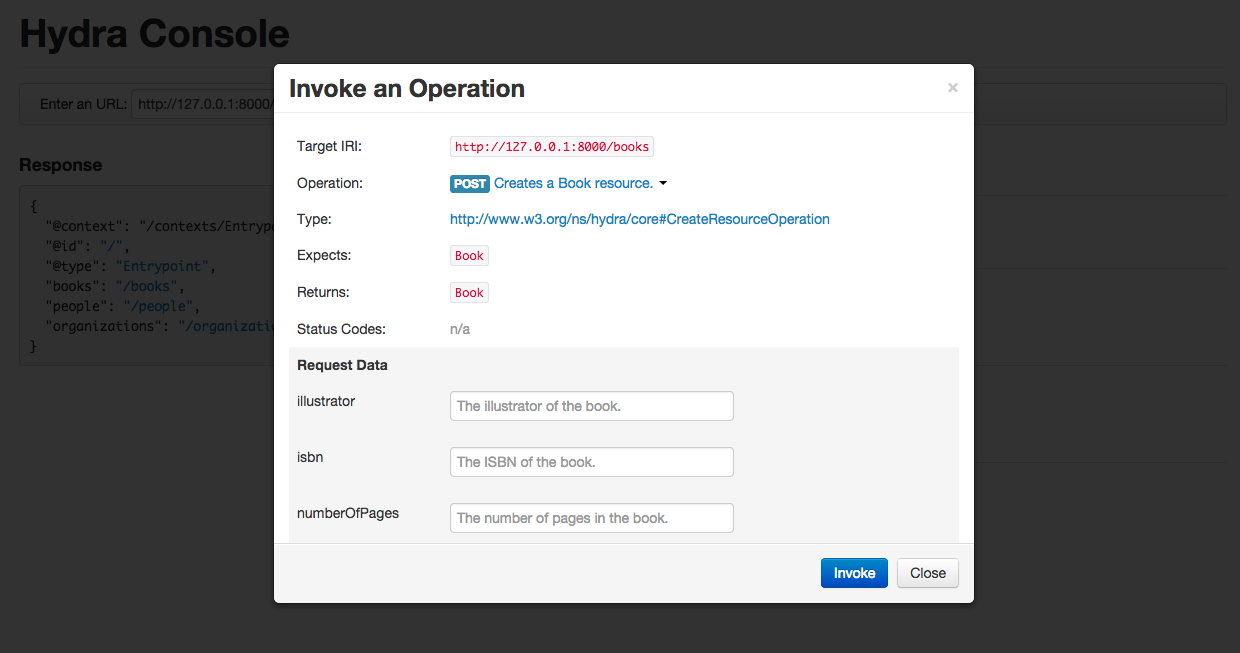 An autodiscoverable Linked Data API for free!
An autodiscoverable Linked Data API for free!
User documentation and sandbox
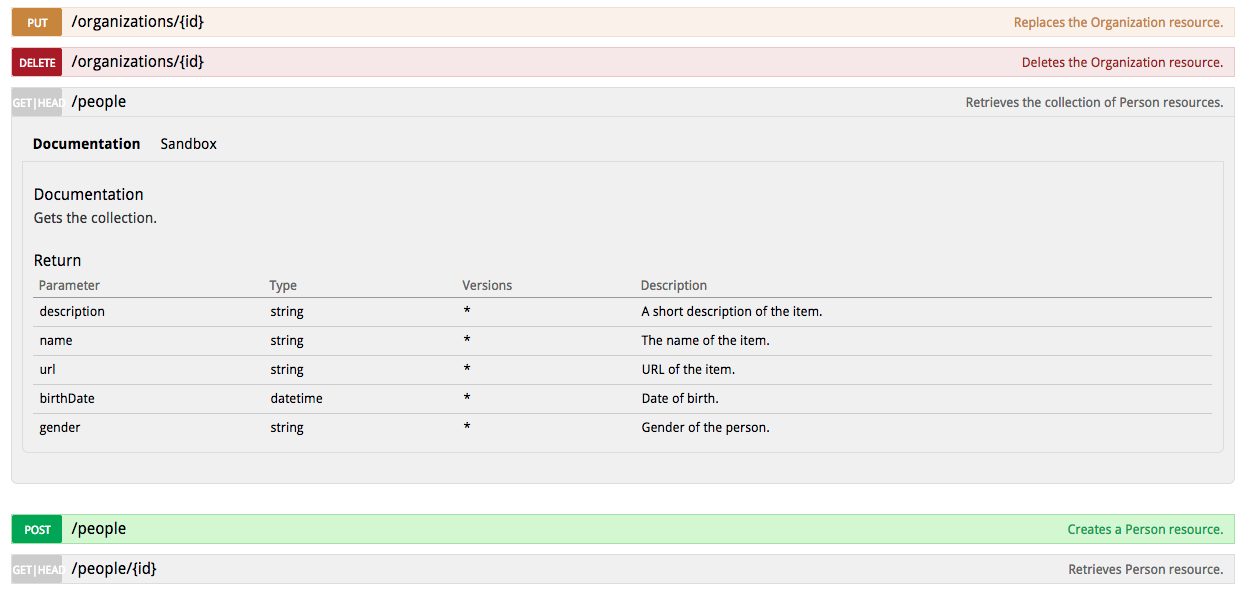 NelmioApiDoc automatically detects and documents exposed resources.
NelmioApiDoc automatically detects and documents exposed resources.
And many more features
- Powerful event system (ex: send a mail after a
POST) - Validation groups
- Serialization groups
- Embed relations (ex:
GETproducts and its related offers) - Custom operations and controllers
- Custom filters and sorting options
- Content Negotiation (experimental)
CORS with NelmioCorsBundle
- The webapp and the API have different domain names.
- CORS headers must be set by the API to let the webapp querying it:
# src/app/config.yml
nelmio_cors:
defaults:
allow_origin: ["https://example.com"]
allow_methods: ["POST", "PUT", "GET", "DELETE", "OPTIONS"]
allow_headers: ["content-type", "authorization"]
max_age: 3600
paths:
'^/': ~Security with LexikJwtAuth[...]Bundle
- Makes the Symfony form login returning a JWT token instead of setting a cookie (stateless)
- Allows to use Symfony firewall rules to secure API endpoints
# app/config/security.yml
security:
# ...
firewalls:
login:
pattern: ^/login$
stateless: true
anonymous: true
form_login:
check_path: /login
success_handler: lexik_jwt_authentication.handler.authentication_success
failure_handler: lexik_jwt_authentication.handler.authentication_failure
require_previous_session: false
api:
pattern: ^/
stateless: true
lexik_jwt: ~
access_control:
- { path: ^/, roles: ROLE_ANONYMOUS, methods: [GET] }
- { path: ^/special, roles: ROLE_USER }
- { path: ^/, roles: ROLE_ADMIN }Cache with FOSHttpCache
fos_http_cache:
cache_control:
rules:
-
match:
path: ^/content$
headers:
cache_control:
public: true
max_age: 64000
etag: true
Specs and tests with Behat
Behat and its Behatch extension make testing and API easy.
# features/put.feature
Scenario: Update a resource
When I send a "PUT" request to "/people/1" with body:
"""
{
"name": "Kevin"
}
"""
Then the response status code should be 200
And the response should be in JSON
And the header "Content-Type" should be equal to "application/ld+json"
And the JSON should be equal to:
"""
{
"@context": "/contexts/Person",
"@id": "/people/1",
"@type": "Person",
"name": "Kevin",
"address": null
}
"""
Tools for the static webapp
- Angular, React, Ember, Backbone or anything else
- Restangular
- Auth0 JWT libraries
- Yeoman, Gulp or Grunt, Bower, Jasmine, Karma...
A JavaScript client
'use strict';
angular.module('myApp')
.controller('MainCtrl', function ($scope, Restangular) {
var peopleApi = Restangular.all('people');
function loadPeople() {
peopleApi.getList().then(function (people) {
$scope.people = people;
});
}
loadPeople();
$scope.newPerson = {};
$scope.success = false;
$scope.errorTitle = false;
$scope.errorDescription = false;
$scope.createPerson = function (form) {
peopleApi.post($scope.newPerson).then(function () {
loadPeople();
$scope.success = true;
$scope.errorTitle = false;
$scope.errorDescription = false;
$scope.newPerson = {};
form.$setPristine();
}, function (response) {
$scope.success = false;
$scope.errorTitle = response.data['hydra:title'];
$scope.errorDescription = response.data['hydra:description'];
});
};
});They already use API Platform

Stay tunned
- API Platform 1.1: The first beta released for #forumPHP
- Support of other persistence layers: soon!
- Dynamic admin: soon!
- API Platform 2.0: Already a work in progress